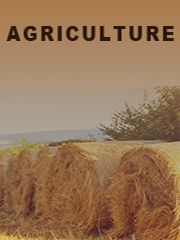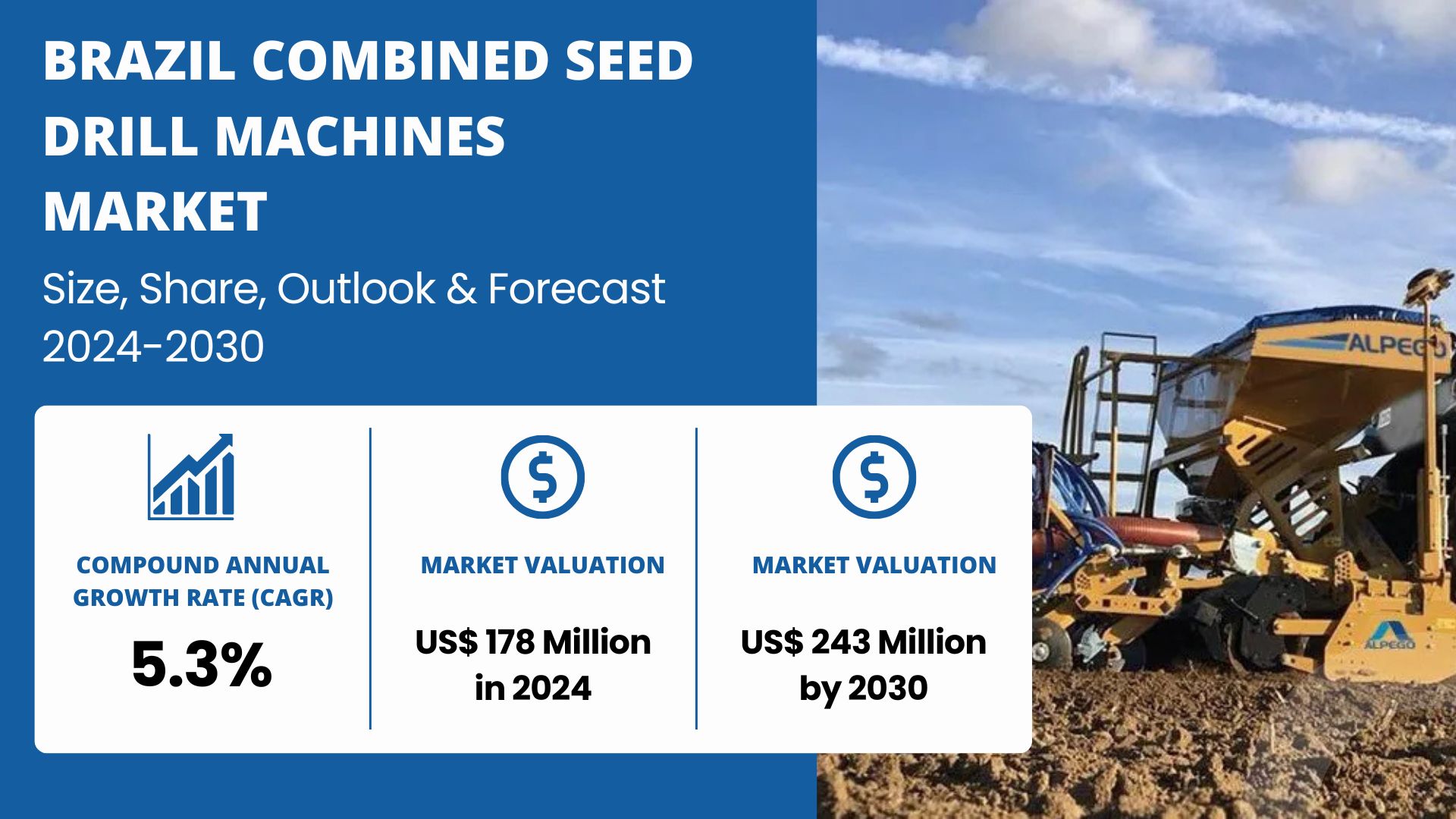TOP CATEGORY: Chemicals & Materials | Life Sciences | Banking & Finance | ICT Media

Download Report PDF Instantly
Report overview
The "Brazil Combined Seed Drill Machines Market" size was valued at US$ 178 Million in 2024 and is projected to reach US$ 243 Million by 2030, at a CAGR of 5.3% during the forecast period 2024-2030.
Combined seed drill machines are agricultural implements that perform multiple operations simultaneously, typically combining seed planting with fertilizer application and soil preparation.
Combined seed drill machines are agricultural implements designed to plant seeds efficiently by embedding them directly into the soil at precise depths and spacing. These machines often incorporate fertilization functions, combining both sowing and fertilizing in a single pass, thereby saving time and improving crop yield. In Brazil, where agriculture plays a significant role in the economy, combined seed drill machines are commonly used for planting crops such as soybeans, corn, wheat, and rice.
Key Points:
Precision Planting:
Combined seed drill machines ensure accurate seed placement, both in terms of depth and spacing, which is critical for optimal germination and crop growth.
Fertilizer Application:
Many of these machines come with integrated systems to apply fertilizer simultaneously with the seed sowing process, improving nutrient delivery and promoting healthier crop development.
Time and Labor Efficiency:
By performing multiple tasks (sowing and fertilizing) in a single pass, these machines reduce the need for multiple operations, saving time, fuel, and labor costs.
Adaptability to Soil Types:
In Brazil, where the soil composition varies greatly, combined seed drills are designed to work in diverse conditions, including sandy, clay, or loamy soils, making them versatile across different agricultural regions.
Large-Scale Agriculture:
Brazil is known for its extensive farming operations, and combined seed drill machines are essential for planting on large farms efficiently. They are often used in conjunction with high-horsepower tractors to cover large areas quickly.
Improved Crop Yields:
The precision of combined seed drills minimizes seed wastage and ensures uniform seed distribution, contributing to better plant growth and higher crop yields.
Conservation Tillage:
Many modern seed drill machines in Brazil support no-till or minimum-till farming practices, which help preserve soil structure, reduce erosion, and maintain soil moisture levels.
Technological Integration:
Some of the advanced combined seed drill machines used in Brazil are equipped with GPS, sensors, and software to monitor sowing operations, enabling farmers to optimize field performance and reduce input costs.
Cost-Effectiveness:
By combining sowing and fertilizing, these machines lower operational costs and are particularly valuable in regions like Brazil, where maximizing agricultural efficiency is crucial due to large-scale production demands.
With agriculture being a pillar of Brazil's economy, combined seed drill machines play a critical role in enhancing farming productivity and sustainability across the country.

Brazil's combined seed drill machines market is growing steadily, driven by the mechanization of agriculture and the need for efficient planting solutions in large-scale farming operations. In 2023, soybean and corn production accounted for 70% of combined seed drill machine use in Brazil. The market saw an 8% increase in sales of precision planting-enabled seed drills in 2023, offering improved seed placement accuracy and stand uniformity. Adoption of no-till seed drills is growing at 6% annually, aligning with conservation agriculture practices. Key manufacturers are investing in developing smart seed drill technologies, with a 12% year-over-year increase in product launches featuring GPS-guided section control and variable rate capabilities. The industry is also witnessing a trend towards wider working widths, with a 15% rise in sales of seed drills capable of planting 24 or more rows in a single pass. Brazil's expansion of cultivated area and the drive for improved operational efficiency continue to drive combined seed drill demand, with a 7% increase in machine sales to medium and large-scale grain producers seeking to optimize planting operations and reduce labor costs.
This report contains market size and forecasts of Combined Seed Drill Machines in Brazil, including the following market information:
Report Includes
This report presents an overview of Brazil market for Combined Seed Drill Machines , sales, revenue and price. Analyses of the Brazil market trends, with historic market revenue/sales data for 2019 - 2023, estimates for 2024, and projections of CAGR through 2030.
This report focuses on the Combined Seed Drill Machines sales, revenue, market share and industry ranking of main manufacturers, data from 2019 to 2024. Identification of the major stakeholders in the Brazil Combined Seed Drill Machines market, and analysis of their competitive landscape and market positioning based on recent developments and segmental revenues.
This report will help stakeholders to understand the competitive landscape and gain more insights and position their businesses and market strategies in a better way.
This report analyzes the segments data by Type, and by Sales Channels, sales, revenue, and price, from 2019 to 2030. Evaluation and forecast the market size for Humidifier sales, projected growth trends, production technology, sales channels and end-user industry.
Key Companies Covered in this Report:
Including or excluding key companies relevant to your analysis.
The report also provides analysis of leading market participants including:
Key Indicators Analysed
Key Benefits of This Market Research:
Key Reasons to Buy this Report:
We offer additional regional and global reports that are similar:
Customization of the Report: In case of any queries or customization requirements, please connect with our sales team, who will ensure that your requirements are meet.